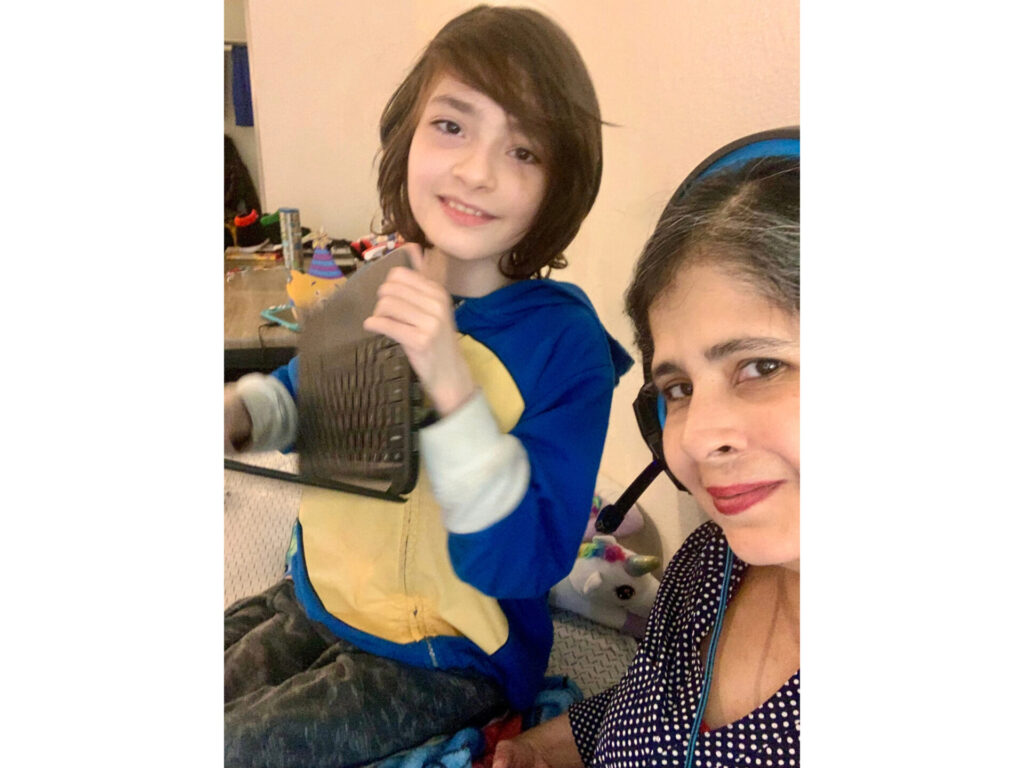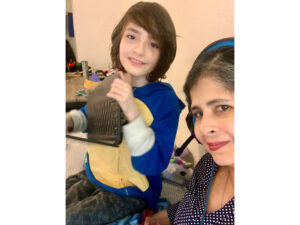Miriam Reyes, WAA Crisis Stabilization Navigator
The connection between autism and mental health is deep and complex — they’re often intertwined in ways that impact diagnosis, care, and daily life. This complexity is one that I navigate daily as a parent to an autistic child and as a mental health professional with decades of experience working with neurodiverse clients of all ages.
Before my son’s autism diagnosis in 2015, my understanding of mental health and mental health services was strictly based on my professional training. I was the “textbook therapist” whose knowledge of mental health came from a textbook but lacked lived experience of the therapy process from the client’s point of view. That was until the day I started the process of autism evaluation for my son, Kenneth.

During his infancy, Kenneth developed at the speed of light compared to his peers until he wasn’t. At the age of 1, he experienced regressive autism…a rare but very profound type of autism. He lost all his words, developed significant sensory issues (mostly with sight and hearing), and developed severe social anxiety. From the start of his diagnosis process, it was clear there was no unanimous understanding of autism among medical and therapy providers. Some medical providers ignored my concerns, while others showed urgency in having him formally tested. Not surprisingly, this caused a lot of mental stress on both my son and me.
Once he was given his formal diagnosis, the issues increased…while we finally knew what we were dealing with, I became aware very quickly how broken the mental health system was for autism families. There was no immediate mental health support for the parent who had just experienced a major family crisis and was left to fend for themselves. And there was no immediate or appropriate mental health support for the autistic child. A child who has to now experience a world they are not able to fully understand, let alone accommodate their neurodiversity.
The autistic individual is often left out of the mental health process. Autistics are often misguided by therapy providers, unknowledgeable on the topic of autism, to believe all their behaviors and mental health issues are part of their autism diagnosis instead of being comorbid with it. This results in the autistic individual being underdiagnosed or misdiagnosed. The amount of mental health services available to them is also limited, frequently not covered by insurance, and involves long waiting lists.
Mental health crises are a common occurrence in the autism community. Autistics have to experience a significant crisis episode before they are provided with mental health services. And it is not uncommon for these services to be short-term or provided in out-of-state institutions. The autism parent/caregiver is also not able to access appropriate mental health services for themselves, as they often lack the time and resources, given that their days are spent finding and advocating for services for their autistic loved one. Mental health services often don’t take into account the full-time investment that being a caregiver to an autistic child requires. The connection between autism caregivers and C-PTSD (Complex Post-Traumatic Stress Disorder) is very real, though it’s not always widely acknowledged. Caring for an autistic individual — especially in systems that lack support — can be emotionally intense, isolating, and even traumatic over time.
The cost of a broken mental health system
Chronic Stress Without Relief
- The caregiver role often involves 24/7 responsibility, especially for individuals with high support needs.
- Lack of consistent mental health care, affordable services, and autism trained professionals leaves the autistic individual to endure the mental issues on their own while also navigating their autism needs.
- Constant mental fatigue and burnout can wear down the nervous system. An issue both parents and their autistic loved ones experience frequently due to a lack of mental health services.
Medical and Educational Trauma
- Repeated battles with mental health care providers/service agencies and school administrators to get basic support and having to advocate or “fight the system”; for proper diagnosis, accommodations, or therapies result in medical and educational trauma.
Social Isolation
- Many caregivers report losing friends, social lives, and support networks over time. Autistic individuals often report experiencing rejection within their social circles.
- Family members and friends may not understand the diagnosis or may even contribute indirectly to the stress experienced by the autistic person and their parent/caregiver.
Emotional Toll of Witnessing Struggle
- Seeing a loved one experience meltdowns, distress, discrimination, or regression can be emotionally heartbreaking.
- Many caregivers experience feelings of helplessness or grief, especially if support needs increase over time.
No Time to Heal
- Unlike a one-time traumatic event, the challenges of autism are chronic and ongoing.
- Without therapy, rest, or acknowledgment, trauma accumulates, and healing feels impossible.
Improving the mental health system
There are many changes that, when implemented in our current system, can provide much-needed mental health support to autistics and their parents/caregivers.
- Trauma-informed therapy (especially from providers familiar with disability dynamics)
- Support groups with other neurodiverse families
- Respite care or community programs to create moments of mental respite
- Psychoeducation about C-PTSD, trauma, and self-regulation
- Offering help, even in small ways, to decrease the mental load of caregivers and their autistic loved ones (meals, errands, check-ins)
- Building autistic-affirming therapeutic environments to reduce daily conflict and stress
A promising change
In recent years, I have started to notice a much-welcomed change from within the mental health system. Fellow therapy providers have become more knowledgeable about appropriate autism care, in part due to their own late diagnosis of autism or simply their desire to become more compassionate and effective practitioners.
Advocacy groups, such as the Washington Autism Alliance, have also become a driving force for change, whether these groups are made of concerned parents/caregivers or autistic individuals fighting for a better mental health system. My hope as an autism parent and mental health practitioner specializing in autism services is that, soon, autism-affirming care becomes the norm and the barriers currently preventing access to it no longer exist.


